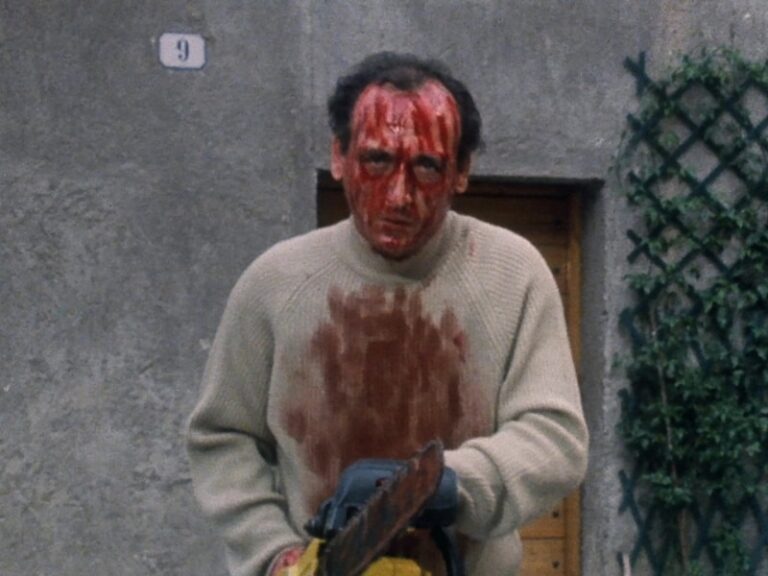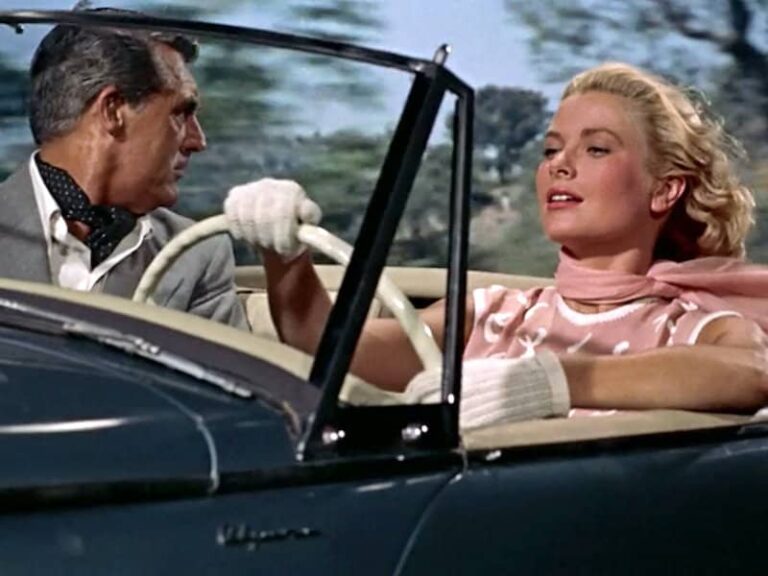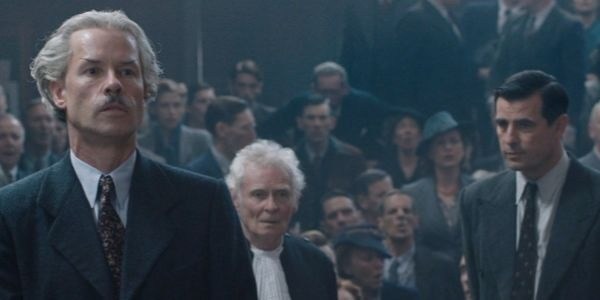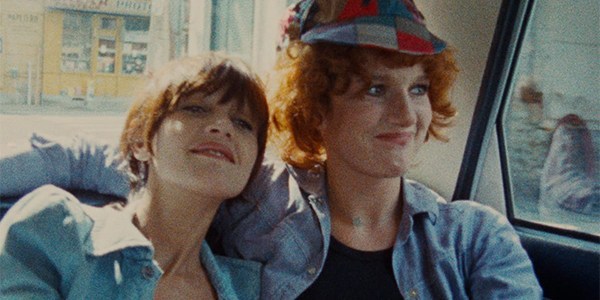Michael Shannon and the State of Small-town Sinners in ‘The Quarry’
The tortured man sees the light of day a fair amount. While the trope happens so often that the very thought of it inspires a plethora of stereotypical interpretations, there’s a reason we keep revisiting it in stories of all kinds. To suffer is to be terribly human, and although painful to undergo, catharsis comes from facing the consequences of our wrongdoing.
Scott Teems‘ The Quarry explores these very notions evocatively and powerfully. In the movie, inner demons intersect and outright clash in a classic American setting: the small, sleepy Southern town. Yet, there is an undeniable universality to its unspoken message about prejudice, personal responsibility, and the path to redemption. Moreover, when you throw the extraordinary Michael Shannon into the mix, as well, the story becomes all-the-more intricate.
Shannon constantly grips audiences with his chameleonic performances. He creates a slew of fictional representations who are lovable, abhorrent, or somewhere in between so cinemagoers get a fully immersive experience. He’s exactly the kind of performer who perfectly upholds both the mantle of leading man and character actor. And although Shannon isn’t preaching on a soapbox, we can always learn something about humanity in his best roles.
In The Quarry specifically, Shannon examines the concept of ubiquities and the very human inclination to indulge in them a little too much. He wants you conscious of the fact that goodness and evilness aren’t mutually exclusive categorizations. I spoke with Shannon over the phone, during which we covered his methods of tackling his character in The Quarry, dove into the social aspect of his other films, and ruminated about the film’s reflection of the state of America today.
Here is our lightly edited conversation:
I’m really excited to talk to you about The Quarry in particular because it’s just as fascinating a film as a lot of your best work is. There are so many layers to unpack, and I’m excited for it to come out.
Oh yeah! Thank you! I think it’s a good time for it to come out, too.
What drew you to The Quarry in the first place?
Well, I felt like it was a story about personal responsibility, which is one of my favorite subjects. Particularly right now, you know, it’s people taking responsibility for who they are and what they do. It’s a story about hypocrisy and kind of the lies we tell ourselves in order to be able to deal with ourselves.
The film has a great screenplay, and the visual language of it is so strong, too. It’s also based on a book [by Damon Galgut]. Did you speak to Scott Teems about the role prior? Did you discuss how you were going to play this part before going on set, or did you simply respond very well to the script itself?
You know, we were based in New Orleans, and we sort of [spent] a couple of hours a day or two before we started shooting just kind of walking around in the city – chewing it out, chewing it over.
But like you say, the script is so well-written, the character just made a lot of sense to me. You know, I come from the South. I didn’t grow up in a city as small as this one, but I know a lot of people who are from small towns, and I’ve been to a lot of small towns, and I can appreciate who this guy is and why he behaves the way he does.
Speaking specifically of your character Chief Moore, chemistry is really important in this film – to convey so much without really having to say a lot. But the Chief also gets to say quite a lot of things, frankly. A lot of quirky lines and a lot of funny ones go to you!
[Laughs]
How do you approach delivering that kind of levity in such a serious film with so much tension?
Well, I think, more than anything, the Chief’s just trying to amuse himself. He’s seen and witnessed over the years a lot of crime, a lot of tragedies. And he’s also dealing with a lot of boredom. There’s either something going on and he has to try and figure it out or there’s probably long stretches when not much of anything happens and he’s just trying to keep from losing his marbles.
So, I think he’s developed this sense of humor, again, it’s very indicative to me of some fellas that I know that come from these smaller towns. It’s just something I’ve seen.
The character doesn’t step out of his uniform. He’s always working, always chasing the case with only a few pockets of intimacy here and there. The Chief doesn’t have a lot of visible inner life but feels very well-rounded anyway. How did you tackle that?
Yeah, well, I hate to sound like a broken record. [Laughs] But again, it’s a very common personality trait that I see in some of these Southern men. They just don’t show their hand unless they’re in a situation where they have to. Probably would’ve been raised a certain way: you don’t cry, you don’t get upset, you don’t pout. You just do your job and you don’t burden others with your problems.
I think, at the end of the day, he’s an ironic combination of virtue but also stupidity. I don’t think he’s an intrinsically evil, nasty person. But he’s just been shaped by his environment and a lot of people. They’re not super cognizant of that, and they don’t really take it into consideration or they don’t try and fight against it. They just let it happen.
And I think that’s one of the cool things about this story. He kind of wakes up a little bit and realizes, “Oh, all these things I thought were true, I might need to reconsider.”
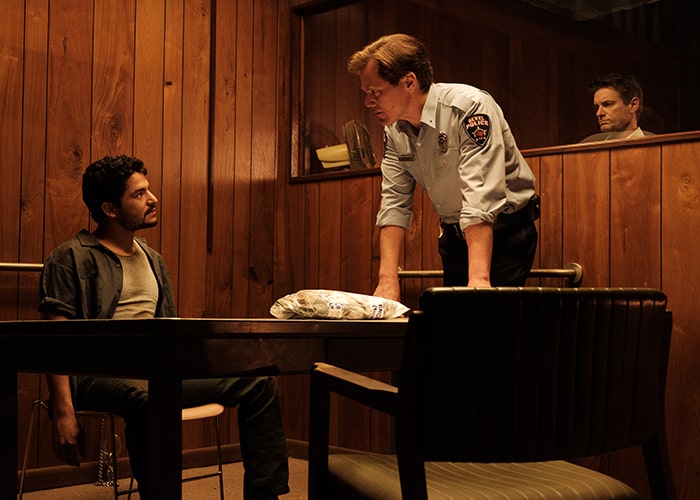
I love that you say he’s not necessarily villainous or evil at heart because the film is all about redemption. A lot of the characters parse through that personal struggle through religion, but yours doesn’t. The Chief is quite adamantly against it.
[Chuckles]
So, what do you think drives him towards vindication, then?
I think you can have a sense of justice and what’s right and wrong without, you know, some religious imperative. It could just be more of a moral imperative. I actually think that’s more admirable, in a way. It’s more unflinching to actually not look for guidance or leadership from some face in the clouds.
Like I said at the beginning of the interview, hold yourself responsible for what you do. And it’s a rare characteristic, but I definitely think it’s one worth putting out in the public eye when you can.
And that [sentiment] ties in so beautifully with the thread of injustice running through The Quarry. Is that what you mean when you said earlier that this is a timely film?
[Chuckles] I don’t wanna sound hostile or anything, but it’s a pretty disappointing time to be an American, at least from my point-of-view. And a large slice of that pie for me is just hypocrisy. I just feel like there’s so much hypocrisy in this country right now. People thinking that they’re one thing when they’re actually something else. It was definitely a draw for me, in terms of telling this story.
A lot of your movies actually do this, like The Shape of Water and Knives Out. They’re all inflecting some kind of social commentary in them.
Yeah, I really liked the way Knives Out did that, ‘cause I felt like it was subtle and still a really enjoyable film. You don’t have to pay that much attention to it if you don’t want to. I mean, that aspect of it [the movie]. But it’s there if you’re willing to follow along with it.
I don’t wanna beat anybody over the head, you know. And at the end of the day, I know a lot of people don’t really care what I think. But it’s my prerogative to tell stories that I think are relevant.
Yeah! To me, that’s an admirable thing for artists in this field to strive for – to entertain and also have something important to say.
Yeah.
I thought the movie really distilled its social issues into something complex and challenging. I watched it twice, and after the second time, I had a surprisingly different reaction to it.
Oh really? That’s great that you watched it twice. Yeah, I do think that it’s definitely one of those movies where you get to the end [and] you wanna go back to the beginning and say, “How did this happen?” And see the steps along the way.
Do you think there’s hope in the movie?
I think there’s hope in the film to the extent that somebody, after having watched [it], might make a change in their own behavior or their own perspective. The hope is in the reaction to the film, in perhaps how it may change things. That’s where the hope is for me.
The Quarry will be out on Demand on April 17.

